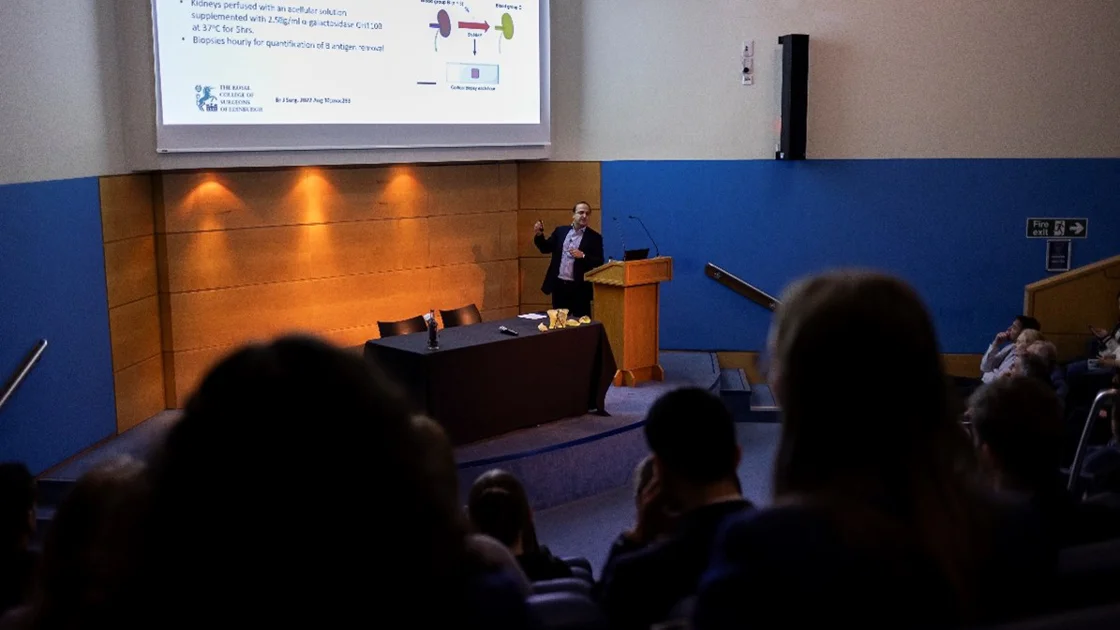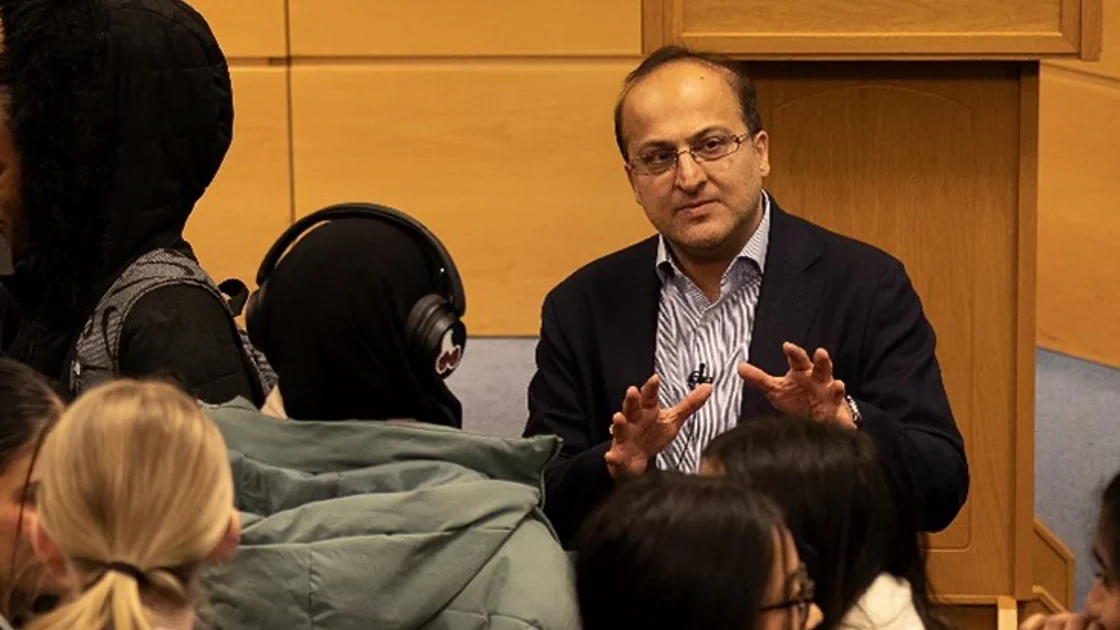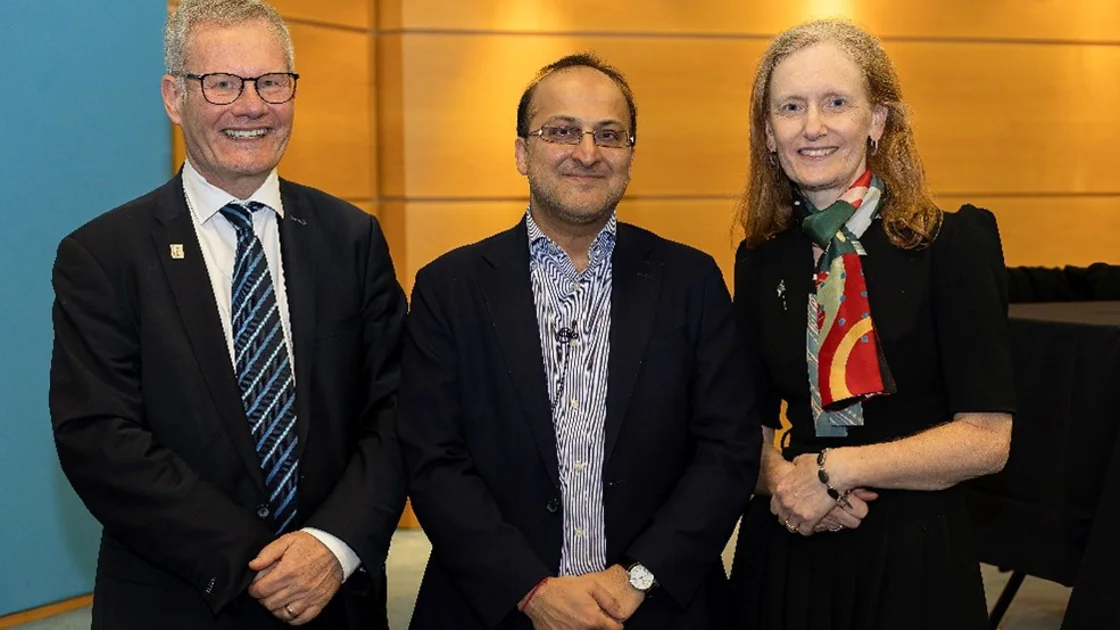The Royal College of Surgeons of Edinburgh’s Annual Christmas Lecture has been running for 55 years, with its core idea to engage and inspire school pupils in medicine and science. Our presenters, who are healthcare and scientific professionals, make connections between classroom learning, real world problem-solving and showcase innovation. Additionally, they provide career insights while highlighting opportunities within healthcare and scientific fields.
Our lecture is a free event available to pupils in S4 and above, with attendance from schools across Scotland. Many of the young people who attend are considering further studies and careers as healthcare professionals. The lecture provides them with an opportunity to explore this interest in the inspiring surroundings of Symposium Hall.

Mr Pankaj Chandak
Presenting to students at the Annual Christmas Lecture 2024.
This year we were fortunate to have Mr Pankaj Chandak as our presenter. He is a transplant surgeon and a Research Fellow at the Institute of Child Health, UCL and King’s College London, as well as a Royal College of Surgeons Hunterian Professor (named after the surgeon-scientist, John Hunter, (1728-93)). Pankaj took our audience through his journey of how asking the right questions, collaborating with multidisciplinary teams, applying scientific research and focusing on the patients’ needs led to the innovative use of technologies, culminating in his use of patient-specific 3D-printed models. These models were created from the medical imaging of a father’s adult-sized donor kidney and his two-year-old daughter’s abdomen to plan her complex paediatric kidney transplant. Along the way, we gained an insight into another area of his scientific work: advancements in machine transfusion technology that not only keep organs alive outside a human body but also repair and potentially improve their function. The machine is also used to model disease processes, such as transplant rejection, enabling scientists to find more effective treatments. We even watched a video of a kidney producing urine outside the body on the machine, which pumps blood-based warm oxygenated solutions into the organ itself.

Mr Pankaj Chandak
3D-printed model of a small child’s abdomen and an adult sized donor kidney.
Pankaj reminded us all that transplant procedures involve an additional patient: the donor. The profound human aspect of transplantation was emphasised when Pankaj shared a BBC Children in Need video on the “Harmonies of Hope” choir, which he founded. The choir is composed of children who have received a kidney transplant and their siblings. Pankaj shared the joy and elation he experiences when a patient with a new kidney passes urine for the first time, urging the school audience to maintain lifelong curiosity and ask insightful questions.
Pankaj concluded his lecture by asking his young audience to reflect on two wonderful aphorisms shared by his own role models, which he believes convey an important Christmas message that we must all embrace: “There is only one rule; put yourself in the patient’s place” by Joseph Lister OM FRS (1827-1912) and “ ..be fit to compare yourself to a candle, that you may, like it, shine light to those around you, and in all actions, you may justify the beauty of the taper, by making your deeds honourable and effectual as you discharge your duties to your fellows..” Michael Faraday FRS (1791-1867), from “The Chemical History of a Candle” Royal Institution Christmas Lecture. Wonderful aphorisms indeed!
There are numerous ways to evaluate an educational lecture. However, the long line of enthusiastic, inspired and motivated young people who gathered at the end of the lecture to speak with Pankaj was the highlight of the afternoon. We were grateful to Pankaj, who stayed well after the lecture had concluded, taking time to answer questions and chat with the pupils.

Mr Pankaj Chandak
Speaking to students following the lecture.
I would like to thank our AV team for all their support and guidance throughout the event and for taking the time to work with Pankaj the day before to set the lighting and audio for his presentation. Thank you to our museum team for their efforts behind the scenes in ensuring the event’s smooth execution. Thank you to Ms Amanda McCabe and Professor Robin Paton, our College members, for liaising with our presenter. A special thank you to Mr Pankaj Chandak for his inspiring presentation and for sharing his valuable experiences with our audience.

Christmas Lecture 2024
L-R: Professor Robin Paton (RCSEd Honorary Secretary), Mr Pankaj Chandak and Ms Amanda McCabe (RCSEd Council Member)
Finally, the warmest thank you goes to the teachers and pupils who supported our event. I will leave you with some insightful feedback we received from a young person who attended the event:
"This was an amazing and insightful opportunity, which has opened many of our eyes into the exciting future of medicine. Dr Pankaj by telling your experiences and showing both the good and the bad, you have given us the opportunity to think outside the box and ask ourselves more questions. You have truly inspired us all. Thank you all so much."
Written by Carl Ronan, Surgeons’ Hall Museums Learning Officer.
Photography credit: Olga Tyukova

